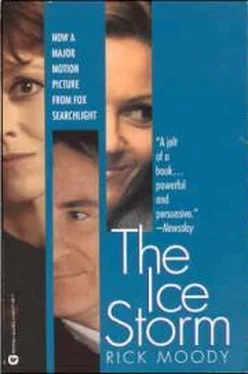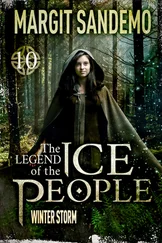Then silence took hold of the participants. Whispers, that fall, at cocktail parties or on the paddle-tennis courts, spoke of unsubstantiated liaisons between those whose night of passion was intended to be singular, unique, unrepeatable. Annie Buckley told Maria Smith who told Maura O’Brien who told her husband, Phil O’Brien, the urologist, who told Steve Buckley in the very midst of percussing Buckley’s enlarged prostate, who told his wife, Annie, who knew already. And as this information circulated — according to statistical order and disorder, according to summation, transition, and reciprocal induction — it became painful, injurious. It became compulsive. You couldn’t avoid talking about it and yet you did nonetheless. Just as the key parties themselves persisted.
How could Benjamin and Elena have been so stupid? They ought to have known. Invitations usually didn’t advertise a key party, but somehow the word usually got out. You had to be in the food chain to know, but then that was the premise of an invitation, right? The Hoods hadn’t attended any of the key parties, but not because they had discussed it. No, they hadn’t been to a key party because they hadn’t been invited.
Anyway, Benjamin thought, Elena was no swinger.
Hood worried again about his ascot. In the half-defogged rearview mirror he unknotted the thing from his neck and breathed a sigh of relief.
— This just isn’t the best moment for this, Elena said. He did his best to avoid her distress. Trying to repair the situation would only be selfish. With his handkerchief he began to clean the window on the driver’s side.
— It’ll just streak, she said.
— I know. I know that, Hood said. Well, if we’d understood we could have fabricated an excuse. Plenty of movies to see. There’s a little thing of tissues in there.
She opened the glove compartment.
— Well? she said.
He took in the cool glow of her pale, pale eyes. She had left her glasses at home. Sometime in the midst of that uncomfortable discussion back at the house she had left off her glasses. (For a time she had worn contact lenses, which clogged with pollution whenever she wore them, or which would pop out, pop like a fierce tear from her eye and drift to the floor, so that the two of them would fall into a prayerful attitude and comb the rugs and floors at parties.)
— I think we’re here and we don’t have to stay — we ought to simply put in an appearance and then we can head home.
He knew this wasn’t her feeling.
— Darn it, Ben—
— I’m not staying at this party so that I can go home with someone else’s wife, darling. Let’s just talk about it. That’s not why we’re here. Right? We’re simply being neighbors here, and I think we should do just that, and then we can go.
— You’re going to—
— I’m not.
— You have some marker, that’s what I think, if you want to know the truth. You have some marker and you’re going to put it on the house keys so that Janey can find them and then when I get back to the house I’ll find the two of you in there and Wendy’ll be able to hear you and Paul will be back and he’ll hear you and I’ll catch you, that’s what I think. She’ll be moaning and swearing, banging against the wall and I’ll catch you—
Elena smiled faintly when she was distressed — he attributed this to the way things went during her childhood — and she was smiling now. In a way, it was a diabolical smile, the smile of a conspirator or politician, just as she was rubbing her eyes. Her nose was red.
— Elena, he said.
And he offered to take her hands.
— It’s not like you think, he said. It’s not a big plot, honey. Honestly. Honestly. I don’t know if you want to go over this now, but it’s just something that comes over me. I don’t feel good about myself. I don’t feel good about it at all. I know that I’ve done what I didn’t want to do, and I don’t know why. So I’m not going to do it tonight, Elena. That’s my solemn… that’s my promise.
— Well, I’m really pleased to hear a confession, she said. I’m happy about that.
He said nothing. Switched the heat from defrost to ordinary heat. It roared from the vents in the dashboard.
— You imagine you’re protecting me from some wicked ways of the world, but you’re not protecting me, Elena said. I don’t need your protection, you know. I don’t.
— Oh, you’re just getting wound up to get wound up.
— Thanks for the diagnosis, Ben. Living so close to the… to Silver Meadow, that’s opened you up. You’re very open tonight. You’re at some magnanimous spot. I’m not an earnings model. And I’m not a subject for your casual sort of analysis. So let’s go to this fiasco if that’s what you want to do. Let’s just go on in. I’d rather talk to anyone else but you.
And she threw open the door of the Firebird and gathered the Dubarry raincoat-$85 with liner, 65 percent dacron and 35 percent cotton — around her. She gave the door a good heave — with American cars it needed that — and left him there.
Hood reopened the glove compartment and fumbled around for the flask. With a brisk, purposeful negligence, he hoisted it in his wife’s honor.
His capacity for drinking surprised even him, but it paled in the face of his capacity for self-deception. His denial was significant enough to suppress even any notion of denial. He concealed in himself all notions of motive. So as he lifted the pewter flask again — warm from its proximity to the heating vents on the dash-any questions about the key party or its farcical possibilities failed to occur to him. Where his motives were concerned Hood was like a blind man without a cane. He was night diving. He was flying without instruments. He was going to this party.
When he followed Elena in, minutes later, it was with the elation of stiff drink. Thus elated, he elbowed past the Sawyers — gabbing with Dot Halford in the doorway — and worked his way into the conversation. He wanted to get to the bowl.
— More than pleased to be part of the proceedings, he mumbled. And then he ceremoniously tossed his keys to Dot — a jaunty little toss — as though she were the parking flunky for the evening, and she, startled, angled under them with the bowl. For a moment she was frozen, with her carefully lipsticked mouth open wide, and then she made the catch. The keys were nestled among their brethren. The sound of keys seemed to follow. Dot frowned. The Sawyers said nothing.
This giddy feeling evaporated almost immediately. In the foyer, surrounded by couples he hadn’t met, couples giggling nervously or ribaldly about the storm, the bowl, the party, their good luck, in the foyer, Hood ran into George Clair. From the office. Benjamin was on his way to the bar to get another drink, though he felt already that words were dissolving on his tongue, that the beginnings of WASP pronunciation were upon him — people always felt it was an ethnic thing. Then Clair appeared, in his bow tie and navy blue blazer. Elena was vanishing deep into the pantry of the Halfords’ house and Benjamin could feel himself stretch out toward her, to apologize again, but Clair was in his way. A faint fecal odor perfumed George always.
The house of Shackley and Schwimmer had been at one time the most maverick and creative of the brokerage operations on the street. This was circa the Summer of Love. Though Hood hadn’t sampled the psychedelic cafeteria of that time, he often felt that he had come close — as close as those subordinates who smoked joints and finger-painted at Trinity Church at lunchtimes, who knew the unemployed musicians who played there, who could read the hidden messages in rock-and-roll album sleeves. Even Shackley and Schwimmer themselves had been known to turn up at Trinity now and then. They also went to parties to benefit the Black Panther Defense Fund. They opposed the Vietnam conflict. They were fellow travelers.
Читать дальше












